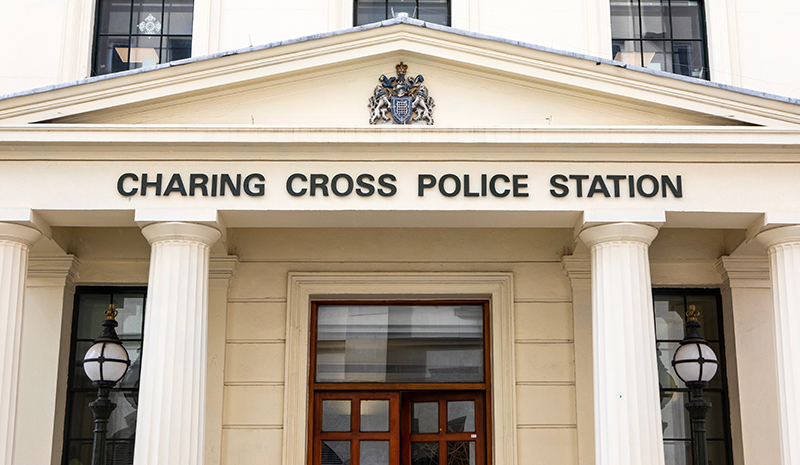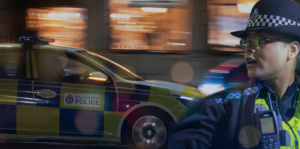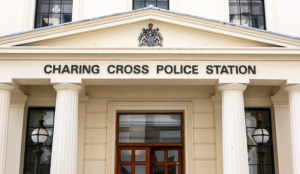My most recent ride-along was actually more of a walk-along, as I went out with two Paired Patrols from Charing Cross Police Station’s Neighbourhood Policing team at the invitation of Insp. Greig Baker-Doyle.
The Tuesday afternoon with PCs Amy Shearlock and Siobhan Ashton on the early shift – then with PC Charlie Saunders and Probationer PC Jamal Ibrahim on a late turn – would have been unremarkable except for the fact that, coincidentally, it fell on the day that the Casey Review into the Culture of MPS was published.
The subject of the Casey Review and its impact on the Officers would have been impossible to avoid, given the amount of newspaper stands proclaiming the headlines we walked past, but it came up even before we went out.
I was interested to observe the different reactions, which – that afternoon, at least – were broadly split by length of service. The Officers I accompanied all had three years’ service or less and felt that the criticism was “more of the same” and claimed it did not affect them. In contrast, the Officers with longer service had stronger reactions which ranged from an acceptance that things had been bad – quote – “a while ago” and highlighting the report might help prioritise better funding for the service through to anger that – another quote – “none of the really good stuff” was reported. Particular ire was reserved for the suggestion that some politicians said they did not trust the MPS while being happy to trust them to provide protection and even possibly to take a bullet for them in doing so.
While out with Amy and Siobhan, we talked about the history of sexism in our respective roles. I am a female in my 50s and have worked for more than 30 years in financial services, which has been dominated by males for centuries (although that has begun to change over the last decade or so).
Amy has been in the job for 3 years, and Siobhan for 2. Both said they experienced sexism on an almost daily basis, but that it came from the public rather than their colleagues. Apparently, it ranges from very mild comments like, “You’re really beautiful, do you know that?” through to what people planned to do to them sexually and how much the Officers would enjoy it. What struck me was the acceptance that this was almost a part of their jobs and what they expected to hear: “They’re not really talking to me, they’re talking to the uniform – no one says it if I am in plain clothes. I know they don’t mean it.”
When the Casey Review report was published, some other forces commented that they felt they might also be vulnerable to similar criticism. His Majesty’s Inspectorate of Constabularies and Fire & Rescue Services has since reported institutional sexism, racism and homophobia in the UK’s fire services; and there have been several reports over the last couple of years have noted the same discrimination in the health services – both groups of people for which I have huge respect for what they do and are willing to do for us all.
It is clear to me that there is a societal problem here rather than specific to the Police, fire, health or financial services sectors. It is in my children’s sports clubs, in the charities sector (I worked for three years in the commercial arm of a large charity) and all around us. I agree that there are bodies that we should hold to a higher standard – and the Police is definitely one of them – but I also think we need to recognise there is a broader problem that needs fixing. I wish I could wave a wand to provide the fix; as I can’t, I will continue to call it out where I see it and celebrate the people doing great work despite it.
Going back to my day with the Charing Cross Officers, it was Quiet. I learned I wasn’t meant to say “the “Q word” in a way that I assume is akin to how actors refer to the “Scottish play”. Over the two shifts I shadowed, there were two stops which led to six searches (the first stop was two people, and the second was four). Small quantities of drugs were found on one at the first stop and two at the second.
The last area I want to mention today is the Cleveland Police Federation’s Bravery Awards, at which Metfriendly sponsored an award, and I had the honour of being a guest on 30th March. I have mentioned before how inspiring I find these awards; the things Officers do in the course of what they see as being “just the job” are rightly celebrated. DCC Victoria Fuller couldn’t have put it better when she described herself as proud to the point of being “Totes Emosh” about her Officers’ actions. Dead right, DCC Fuller.
 Annette Petchey, CEO Metfriendly
Annette Petchey, CEO Metfriendly
You can read more of Annette’s blog posts and articles here.










